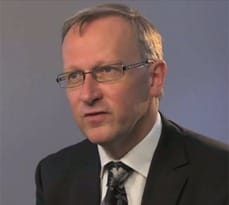Macroeconomist Michael Kitson says economics needs to be more humble and more relevant!
[vimeo id = 47996538]
The years 2010 – 2020 will be a lost decade for the world economy predicts leading economist Michael Kitson, who says a ‘paradigm shift’ in economic thinking should follow the doldrums of recession.
He warns that despite limited growth within the BRIC economies there is potential for very poor global performance over the coming decade.
What is needed in the world economy and individual countries like Britain is high level of aggregate demand and continued investment in new technology and innovation coupled to a renewed approach to economic thinking.
“We shouldn’t think that economics is a science that’s fixed. Economics likes to think of itself as a science like physics – it’s not. It’s about behaviour. It’s about why firms do what they do and why individuals do what they do. We have seen shifts in the past often following big seismic shifts to the economy.
“The great depression of the 1930s ushered in Keynesian economics. The stagflation, stagnating economy high inflation of the 1970s, ushered in new thinking – monetarist economics. We’ve now got this world depression, world stagnation; it’s time to usher in some new economic thinking.”
Michael Kitson feels there are three major elements for a new approach to economics.
Economics itself needs to be a more humble, relevant and less driven by exactitude and mathematical precision.
“Maths can be useful but we’re not all driven by mathematical algorithms. Economics needs to be more humble and learn more from other subjects, be it psychology, sociology, management geography and so on. We need to reframe economics in terms of the way it can help to explain economic behaviour.”
A Senior Lecturer in Global Macroeconomics at Cambridge Judge Business School, Kitson’s second element takes in the role of the state and the provision of goods and services for growth and well-being, particularly the provision of education and health. His third area is around technology and innovation.
“There’s too much of a view that technology is driven by the single-minded scientist, the single-minded entrepreneur taking risks, the venture capitalists.
“They are part of the equation, part of the system, but in terms of long-term growth in innovation, we need investment in science. That increasingly comes from the state because we invest in blue sky research and we invest in new ideas. We don’t know what their impact will be on the economy but often those ideas generate economic growth in the future, the next 20 years, the next 50 years, the next 100 years.”
Michael Kitson is to deliver a lecture ‘2010 – 2020: A Lost Decade for the World Economy’ at the Oxford and Cambridge Club, Pall Mall, London, on Wednesday, 12 September 2012.


